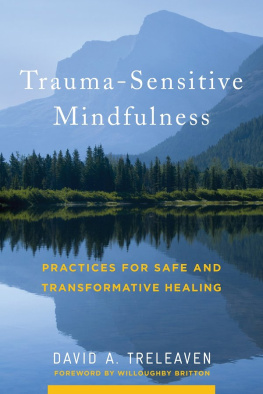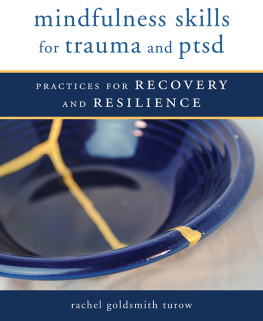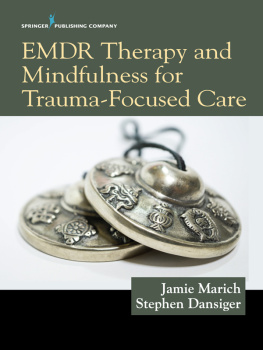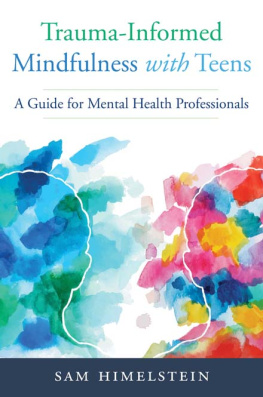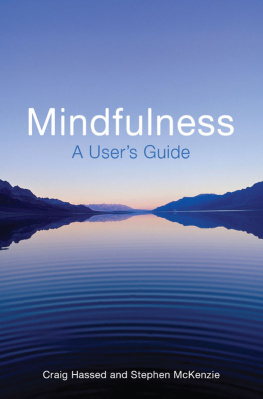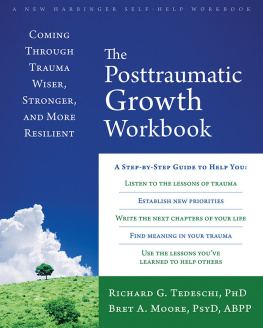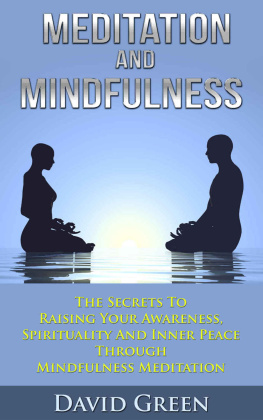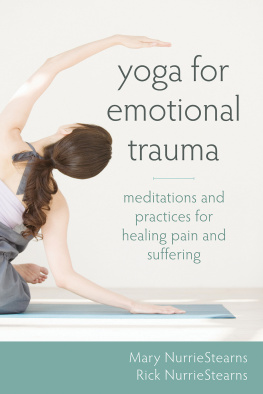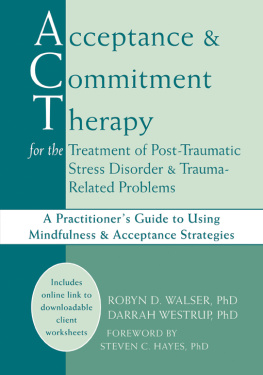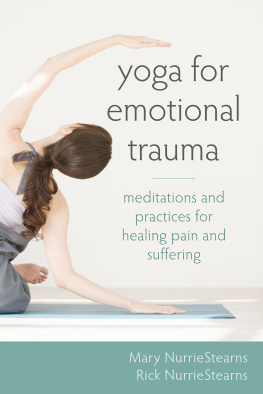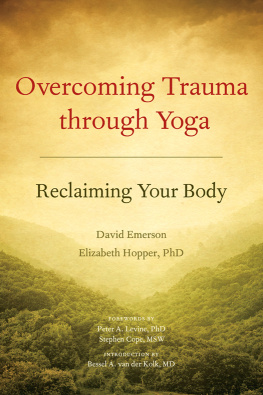TRAUMA-SENSITIVE
MINDFULNESS
Practices for Safe and Transformative Healing
DAVID A. TRELEAVEN
Foreword by Willoughby Britton

W.W. NORTON & COMPANY
Independent Publishers Since 1923
New York London
A Norton Professional Book
This book proposes that trauma-sensitive practice involves resourcing social justice movements challenging systemic conditions that create and perpetuate trauma.
In this spirit, 60% of the authors proceeds from this book will be shared equally between three organizations:
generative somatics
A national nonprofit organization based in Oakland, California, that combines social analysis with trauma healing (generativesomatics.org).
The Healing Justice Program of Black Lives Matter
The Black Lives Matter Global Network is a chapter-based organization working to end state-sanctioned violence and win immediate improvements in the lives of Black people (blacklivesmatter.com).
The Sogorea Te Land Trust
An urban, Indigenous women-led community organization that facilitates the return of Chochenyo and Karkin Ohlone lands in the San Francisco Bay Area to Indigenous stewardship (sogoreate-landtrust.com).
that day discovered that the customary butterflies in my stomach felt more like pterodactyls. Looking at the Dalai Lamas curious face, I was worried how he might respond to my work.
I study the potentially adverse effects of meditation. While the majority of my research over the last 20 years has focused on the clinical benefits of meditative practices, Ive expanded my work over the last decade
Through this research, the particular relationship between meditation and trauma became a thorn in my side. When people whod experienced meditation-related difficulties associated with trauma approached me for help, I couldnt do much more than reassure them that they werent alone, and that what they were experiencing wasnt their fault. During this time, Id always wanted to provide them with something morea comprehensive explanation of why this was happening to them, and what to do about it.
Then, a month after my presentation at Mind & Life, I came across a grainy video online of a Ph.D. dissertation defense on mindfulness meditation and trauma. I had never heard of David Treleaven, but sat mesmerized as he articulately provided the answers I had been seeking. For years, Id been looking for a clear framework that I could offer to the struggling meditators who came to meincluding those who were teaching them, and researchers who were interested in meditation and mindfulness. Suddenly, Id found it. The puzzle pieces clicked into place one after another.
I ended up referring many people to David, and theyd often report back to me that their work together and the framework he provided were lifechanging. Their stories were so compellingand their progress so palpablethat I decided to embark on a multi year trauma training myself. I thought I had sufficient training as a psychologist and neuroscientist, but through Davids insights I realized that I needed to learn more about trauma to competently address the issues I was encountering in my practice and research.
I stayed in touch with David, and when I read the first draft of the book youre holding, it felt like a gift. Based on my conversations with meditation teachers, researchers, and mindfulness practitioners, I believe this book will be a long-awaited resource for many people. With painstaking rigor, compassion, and insight, it addresses some of the most commonbut also most neglectedissues that meditators whove experienced trauma can face.
As readers of this book will know, mindfulness has exploded in popularity. From schools and clinics to prisons and businesses, mindfulness and meditation are now practiced in a variety of settingswith research backing up their benefits. Yet the notion that mindfulness and meditation can be a cure-all for countless conditions and problems, including trauma, has had some unintended consequences. We have all heard of the benefits of meditation, and for many people who practice regularly those benefits become a reality. But I have learned that people who do not have that experience, and who do not share this narrative and trajectory, often feel deeply ashamedparticularly those who have experienced trauma. They often feel that they failed meditation, did something wrong, or are profoundly and irrevocably broken.
Davids book tackles the issue of shame head-on. It challenges the notion that those who experience these difficulties are simply flawed or not good meditators. Many of the meditators who contact meoften teachers themselvesexpress humiliation around the inability to manage their symptoms with meditation. David shows us the perils for trauma survivors practicing mindfulness, explains why they exist, and introduces grounded practices that support a safe and transformative trauma-sensitive practice. His work is evidence based, rooted in clinical research, and receptive to modifications as further research becomes available. As such, the book serves as a foundation for a larger conversation.
This book also offers us a systemic view of trauma. Paralleling Davids own journey, it extends mindfulness from the suffering of isolated meditatorsand their individual nervous systemsinto the social, cultural, and political domains that also play a role in creating and perpetuating trauma. While the idea of interdependencethat we are all deeply interconnected and influencing each otheris not new to the mindfulness community, it is often presented as a kind of metaphysical salve of unity that inspires prosocial behavior but does not require deep personal confrontation. Through his work with social justice movements, David challenges us to question the water around us, to critically examine the frameworks we have been offered, and be increasingly informed about our role.
Trauma-Sensitive Mindfulness comes at a time when a more nuanced conversation around mindfulness and meditation is desperately needed. Ive spent the majority of my academic career advocating for such dialogue, whether in my classroom, at my lab, at academic a contemporary audience.
With this book, Im happy to say were taking a further step together in this new direction. David has created a rigorous, accessible, empirically grounded resource for those of us looking to teach and practice mindfulness in a trauma-sensitive way. Its a timely gift, and one that I hope helps you as much as it helped me.
Willoughby Britton, Ph.D.
Brown University
NOTES
Britton Lab; Dalai Lama Presentation. See https://vimeo.com/69253042.
A summary of the Varieties of Contemplative Experience research project can be found on the Clinical and Affective Neuroscience Laboratory website: https://www.brown.edu/research/labs/britton/research/varieties-contemplative-experience
For an overview paper detailing the study methods and results, see Lindahl, J., Fisher, N., Cooper, D., Rosen, R., and Britton, W. (2017). The Varieties of Contemplative Experience: A Mixed-Methods Study of Meditation-Related Challenges in Western Buddhists. PLOS ONE 12(5): e0176239.
The full text of this paper is available at: http://journals.plos.org/plosone/article?id=10.1371/journal.pone.0176239.
A Qualitative Study of Practice-Related Challenges Reported by Vajrayana Buddhists. Religions 8(8): 153, doi: 10.3390/rel8080153.
The full text of this paper is available at: www.mdpi.com/2077-1444/8/8/153/pdf.
for Teaching Mindfulness: An International Handbook. New York: Springer. Also see Britton, W. B. (2016). Self-Inquiry: Investigating Confirmation Bias. In McCown, D., Reibel, D., and Micozzi, M. S. (eds). Resources for Teaching Mindfulness: An International Handbook.
Next page
